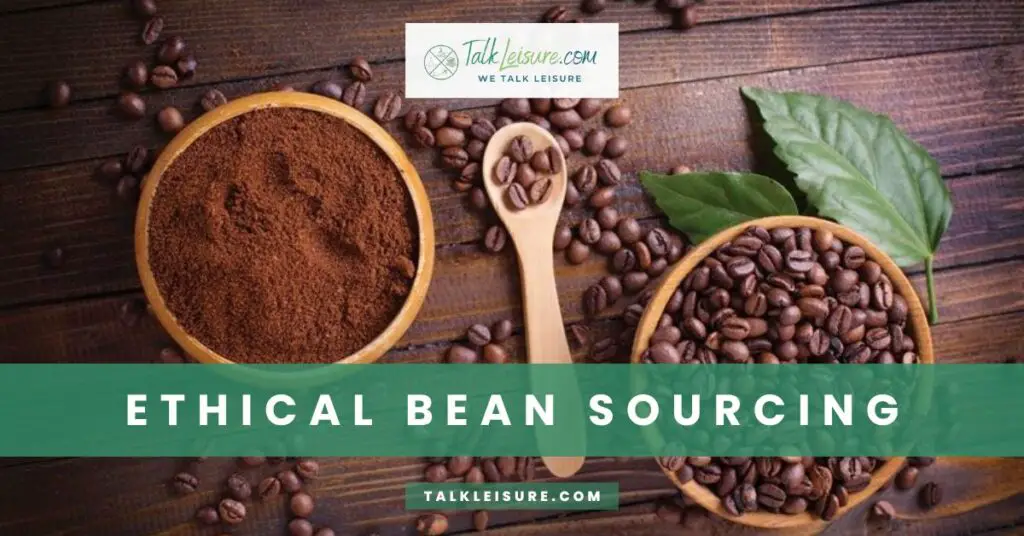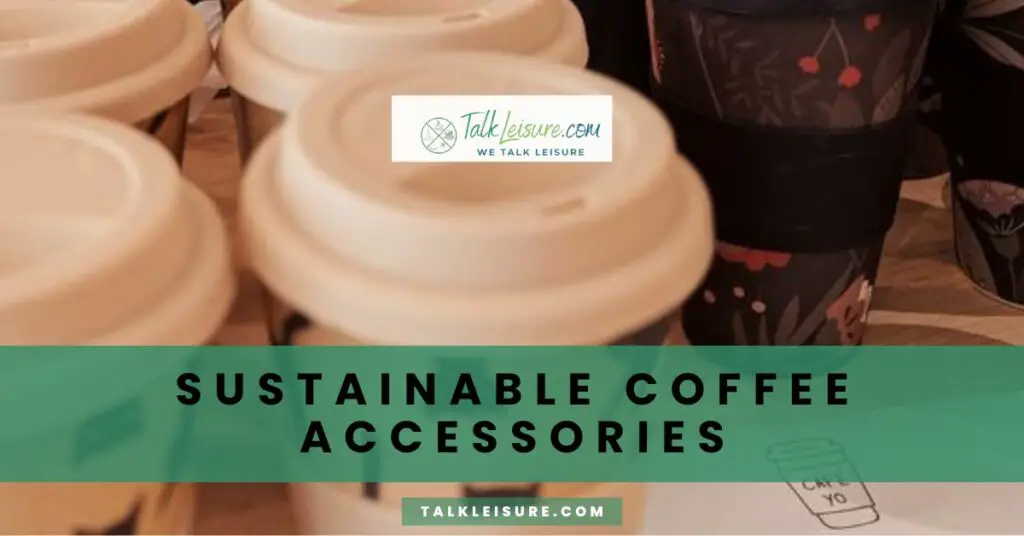In a world where every sip matters, adopting a sustainable coffee routine is not just a choice; it’s a commitment to the planet.
This guide unveils the “7 Best Practices for a Sustainable Coffee Routine,” empowering you to enjoy your daily brew while minimizing environmental impact.
From bean selection to waste reduction, let’s explore practical steps to make your coffee ritual not only a personal pleasure but also a sustainable act.
Minimalist sustainable quality coffee at home?
Ethical Bean Sourcing

The journey to a sustainable coffee routine begins with the beans themselves.
Ethical bean sourcing is a cornerstone of sustainability in the coffee industry.
Opting for beans produced through fair trade practices, shade-grown methods, and direct relationships with farmers ensures that your coffee is not only of high quality but also aligns with ethical and environmental standards.
When you choose beans produced under fair trade practices, you contribute to a system that prioritizes fair wages and humane working conditions for coffee farmers.
Additionally, shade-grown coffee promotes biodiversity by preserving natural habitats, making it a more sustainable and eco-friendly option.
Exploring direct relationships with coffee farmers further emphasizes the transparency of the supply chain.
This connection ensures that the beans are sourced responsibly, and the farmers receive fair compensation for their hard work.
The ethical journey of your coffee beans directly impacts the sustainability of the entire industry, creating a positive cycle from farm to cup.
8 Mistakes You’re Making When Brewing Your Coffee
Eco-Friendly Brewing Methods

Beyond the beans, the brewing method you choose plays a pivotal role in shaping the sustainability of your coffee routine.
Embracing eco-friendly brewing methods can significantly reduce your environmental footprint.
Manual brewing options, such as pour-over and French press, are not only simple and effective but also have minimal impact on the environment.
For those who prefer the convenience of automatic brewers, choosing energy-efficient appliances is a sustainable alternative.
Modern coffee makers with programmable settings and energy-saving features can help minimize electricity consumption without compromising the quality of your brew.
Balancing convenience with sustainability is key.
Evaluating your brewing method allows you to find a harmony that aligns with your lifestyle while contributing to a more sustainable coffee routine.
Waste Reduction Strategies
Coffee-related waste is a common environmental concern, but there are effective strategies to minimize it.
Consider alternatives such as compostable coffee pods, which reduce the environmental impact of single-use pods.
Investing in reusable coffee filters for traditional brewing methods is another simple yet impactful step toward waste reduction.
Repurposing coffee grounds is a creative way to further minimize waste.
From creating natural cleaning solutions to using coffee grounds as a fertilizer, these byproducts can find new life beyond the brewing process.
By adopting these waste reduction strategies, you not only contribute to a cleaner environment but also unlock the hidden potential of coffee waste.
Conscious Consumption
Conscious consumption is at the heart of a sustainable coffee routine.
Small, mindful choices can collectively make a significant impact.
Consider avoiding single-use cups by bringing your own reusable mug to your favorite coffee shop.
Many cafes now offer discounts or incentives for customers who choose to bring their own containers, making this a financially savvy and eco-friendly choice.
Supporting cafes and coffee brands that prioritize sustainability in their practices is another impactful way to engage in conscious consumption.
By aligning your choices with businesses that share your commitment to the environment, you contribute to a larger movement toward sustainable coffee culture.
Sustainable Coffee Accessories

As you curate a sustainable coffee routine, pay attention to the accessories you use.
Opting for eco-friendly travel mugs, durable stirrers, and other sustainable accessories complements your efforts to reduce waste.
Reusable options not only minimize the environmental impact of disposable counterparts but also add a personal touch to your coffee experience.
Sustainable coffee accessories go beyond just being environmentally friendly—they often enhance the aesthetic and tactile aspects of your routine.
Consider investing in accessories made from eco-friendly materials, contributing to a more holistic and sustainable coffee culture.
Energy-Efficient Grinding and Brewing
Energy efficiency in coffee preparation is a crucial aspect of a sustainable routine.
Selecting energy-efficient grinders and brewers can significantly reduce the overall environmental footprint of your coffee-making process.
Many modern appliances come equipped with energy-saving features, allowing you to enjoy your favorite brew while minimizing energy consumption.
Adjusting your brewing habits can contribute to energy efficiency.
For example, opting for a thermal carafe instead of a hot plate to keep your coffee warm reduces the need for continuous heating.
These small adjustments, combined with energy-efficient appliances, make your coffee routine more sustainable without sacrificing the quality of your brew.
Community and Social Responsibility
Beyond individual practices, engaging with the community and embracing social responsibility is the final pillar of a sustainable coffee routine.
Supporting local coffee initiatives, participating in sustainable coffee communities, and staying informed about ethical practices within the industry contribute to a more responsible and conscious coffee culture.
Your choices ripple through the community, creating a positive impact on both a local and global scale.
By participating in coffee-related events, collaborating with local businesses, and sharing your commitment to sustainability, you become an active part of a movement that goes beyond personal routines to influence broader social and environmental change.
Conclusion
In this comprehensive guide to a sustainable coffee routine, we’ve explored the multifaceted aspects of creating an eco-friendly and ethically sound coffee ritual.
From choosing ethically sourced beans to embracing waste reduction strategies and engaging with the broader coffee community, each step contributes to a more sustainable and fulfilling coffee experience.
As you embark on this journey, remember that sustainability is not an endpoint but a continuous commitment.
By integrating these best practices into your daily routine, you not only reduce your environmental impact but also contribute to a larger movement toward a more sustainable coffee culture.
Sip responsibly, brew sustainably, and enjoy the rich flavors of coffee with a clear conscience. Cheers to a future where every coffee routine is a force for positive change.
Frequently Asked Questions
Can I still enjoy high-quality coffee while following sustainable practices?
Absolutely! Sustainable practices do not compromise the quality of your coffee. In fact, many sustainable choices, such as ethically sourced beans and manual brewing methods, can enhance the overall coffee experience.
Are there certifications for sustainable coffee that I should look for when purchasing beans?
Yes, certifications like Fair Trade, Rainforest Alliance, and USDA Organic indicate that the coffee has been produced using ethical and environmentally friendly practices. Look for these certifications to ensure your beans align with sustainable standards.
How can I make my automatic coffee maker more energy-efficient?
To make your automatic coffee maker more energy-efficient, choose a model with programmable settings, turn off the warming plate when not needed, and descale regularly. These practices help reduce energy consumption without compromising the convenience of automatic brewing.
Is it more sustainable to buy coffee beans in bulk or pre-packaged?
Buying coffee beans in bulk is generally more sustainable as it reduces packaging waste. Bring your reusable container to a local coffee shop or purchase from bulk bins to minimize the environmental impact of packaging.
Can I use recycled coffee grounds in my garden?
Absolutely! Coffee grounds are an excellent addition to compost or garden soil. They add organic matter, improve soil structure, and can act as a natural fertilizer. Just ensure you mix them well with other compost materials to maintain balance.
How can I encourage my favorite coffee shop to adopt more sustainable practices?
Engage with your favorite coffee shop by expressing your interest in sustainable practices. Encourage them to use eco-friendly packaging, offer incentives for customers who bring reusable cups, and source ethically produced coffee beans. Your voice as a customer can make a significant impact.
Best Wishes!












